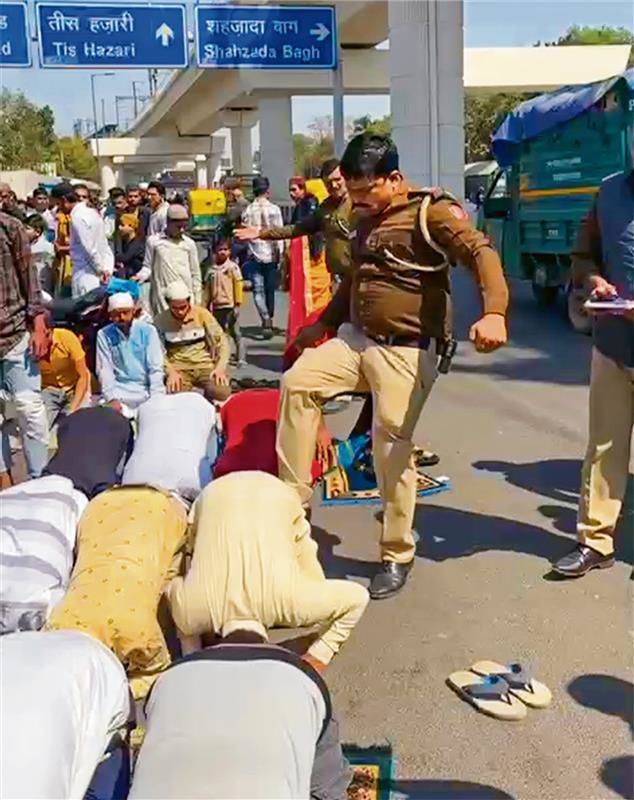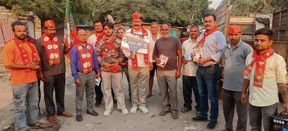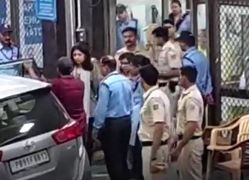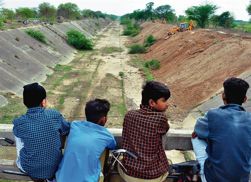
Shocking: Sub-inspector Manoj Kumar Tomar was caught on camera kicking a worshipper in March. PTI
MP Nathanael
Former IG, CRPF
THE Kerala High Court has asked the state government to respond to a plea alleging that the police used excessive force and imposed illegal restrictions recently during Thrissur Pooram. The Pinarayi Vijayan government has ordered a probe and announced the transfer of the Thrissur city police commissioner and the assistant commissioner.
This incident comes less than two months after a case of police brutality. On March 8, a congregation was offering namaz at a mosque near Inderpuri Metro Station in New Delhi. The rush of devotees spilled over to the main road outside the mosque, where they spread mats and worshipped. Unconcerned and insensitive to the fact that it was a religious congregation, Sub-Inspector (SI) Manoj Kumar Tomar of the nearby police post arrived with other policemen and started kicking worshippers, telling them to clear the road. According to witnesses, the worshippers were not blocking the road and the traffic was moving smoothly. A video showing the SI on the rampage went viral, drawing the ire of the public. The SI was suspended, after which the people who had surrounded the police post dispersed.
An IPS officer, Balveer Singh, was suspended in March last year for using third-degree methods on suspects in police custody when he was posted as Assistant Superintendent of Police (ASP) in Ambasamudram subdivision in Tirunelveli district (Tamil Nadu). He is known to have extracted the teeth of 10 suspects using jelly rock; in two cases, he crushed the testicles, leading to a public outrage across the state. He would change into civvies and wear gloves before torturing suspects with specialised implements. An investigation done by an IAS officer concluded that the victims had been tortured in police stations in Vikramsinghapuram, Ambasamudram and Kallidaikurichi. The crime branch of the Criminal Investigation Department filed a chargesheet against the officer and 10 others, including inspectors, sub-inspectors and constables. The IPS officer was reinstated in service in January, while the case is pending in the court.
On October 4, 2022, five men from the Muslim community were tied to a pole in the Undhela village of Kheda district (Gujarat) and publicly flogged by policemen, even as the gathering cheered them. Their alleged crime was that they had disrupted a garba event in the village. A video of the flogging went viral, leading to the conviction of four policemen. They were awarded 14 days’ imprisonment by the Gujarat High Court, which observed that flogging in public was an ‘act against humanity’.
Hearing an appeal against the High Court judgment, the Bench of Justices Bhushan R Gavai and Sandeep Mehta observed that the police not only misused their power but also violated the guidelines laid down in the Supreme Court’s 1997 verdict in the DK Basu case, which strictly warned against custodial torture.
The misconduct or brutality of police personnel has become a common occurrence. Such acts have dented the image of the police, thereby alienating them from the public.
According to data of the National Crime Records Bureau (NCRB), as many as 75 people died in police custody across the country in 2022, but just nine cops — eight from Uttar Pradesh and one from Madhya Pradesh — were arrested. In 2021, 88 people died in police custody; 12 policemen from Gujarat were arrested and nine chargesheeted, while five from Maharashtra and one from Haryana were arrested and chargesheeted.
Many policemen prefer to adopt third-degree methods to extract a confession from suspects in custody. In stark contrast, during training at academies/training centres, they are taught to shun such methods. But due to a lack of patience and with a view to impressing their superiors, they adopt shortcuts. Many policemen in Punjab had to face dire consequences after a series of cases were lodged against them. They had to languish in prisons for the atrocities they committed during the era of terrorism in the state. More recently, the Bombay High Court convicted former inspector Pradeep Sharma and 13 others, including a civilian, to life imprisonment for their role in killing Lakhan Bhaiya, a member of the Chhota Rajan gang, in a fake encounter in November 2006. These cops were patronised and praised during their heyday, earning them the sobriquet of ‘encounter specialists’.
It is reprehensible that superiors come to juniors’ defence when the latter resort to torture. A case in point is that of the Superintendent of Police (SP), Tirunelveli. He turned a blind eye to the atrocities committed by the ASP of Ambasamudram instead of reprimanding him for blatant violation of the law. The Tamil Nadu government ought to have taken action against him for lack of supervision over his subordinates. When subordinates resort to third-degree methods, the superiors — generally SPs — ought to reprimand them. Otherwise, the message that goes out to the public is that the SPs are hand in glove with perpetrators of brutality.
While the superiors are taken to task for the misconduct of their subordinates in the defence and paramilitary forces, it is rarely so in the police force. A Brigadier and a Battalion Commander of 48 Rashtriya Rifles had to face disciplinary action when three residents of a village in Surankote died in custody in December last year The action was taken despite the fact that both were not present on the unit premises when the incident happened.
In DK Basu and Ashok Johri versus State of West Bengal, the Supreme Court had rightly stated: “The police are no doubt under a legal duty and have the legitimate right to arrest a criminal and to interrogate him during the investigation of an offence, but it must be remembered that the law does not permit the use of third-degree methods or torture of accused in custody during interrogation and investigation with a view to solving the crime.”
Join Whatsapp Channel of The Tribune for latest updates.




























